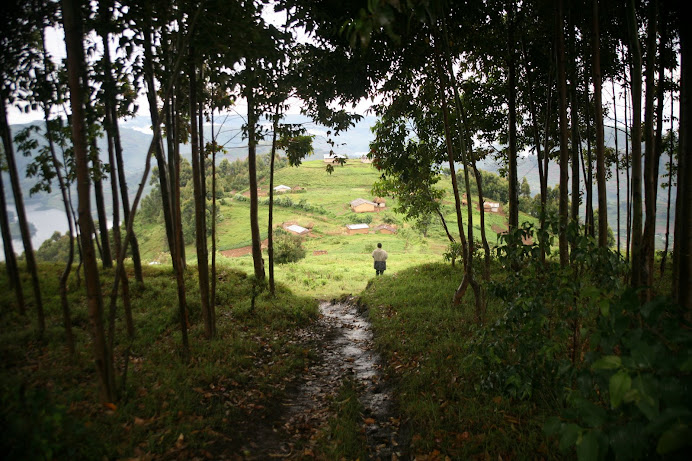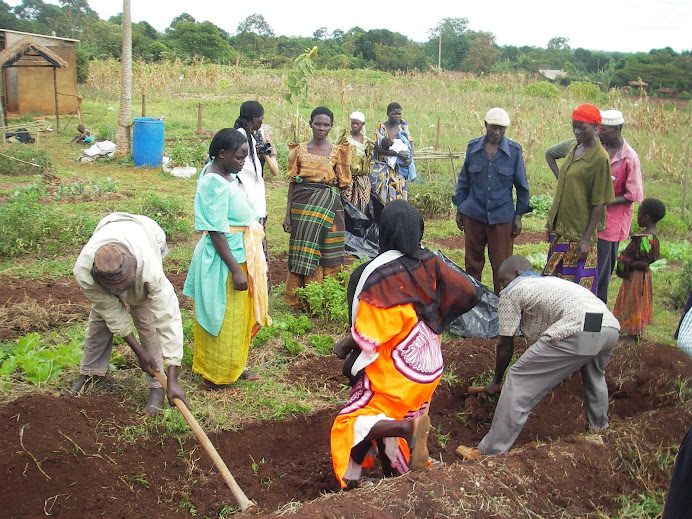We had our first large harvest at the Buwala orhanage! We harvested cucumbers, zuchini, beets, radishes, several salad varieties, many herbs, and more. It was great to see so much color on the children's plates and to enjoy the fruits of our labor.
We have continued our cooking classes at all our project sites. The ladies from the Allan Stine clinic loved their veggie wraps and are slowly incorporating greens into their diet. They have also made their first salad sale to a local restaurant who will continue to purchase salad mixes from the garden. This money will help with garden upkeep and pay a bit extra to the women who take care of the garden.
We have continued our home gardens with both HIV groups. After everyone learned from the demonstartion gardens, we have been able to build each home garden in one day with the help of all the group members. After digging beds, planting, and fencing we will return later for transplanting, weeding, mulching, and pest control. One person has been identified as the local teacher and will be there for any questions that might arise in the future for the home gardens. This will give sustainability to the projects after we leave the country.
This week we will continue with the home gardens as well as build a garden at a Montessori school in Jinja. The garden will help with the childrens lunch diet as well as teach agriculture practices to the kids. We will also be transplanting tomatoes, cabbage, onions, and eggplants at the Buwala orphanage farm. We got the help of agriculture expert Patrick Wiggins this week so things should run quite smoothly.
Monday, February 23, 2009
Friday, February 6, 2009
Feb. 5th
Florence's garden has been planted and fenced with the help of her HIV support group members which consist of 25 women and 3 men within her community. With DIG's funding she has been given 100 layer chickens to help supplement her income. The group members have selected 6 members which will get home gardens of their own with everyone's assistance. We will be helping with the gardens and providing tools & seeds but they are ultimately responsible for their implementation since they now have the knowledge from the demonstration garden. Florence plans on using a portion of her income on the egg sales to also buy day old chicks for other members of her group. Next week we will be transplanting with the group for our last demonstration before other home gardens commence.
DIG has funded the Budondo Health Center's ISSB water tank. The bricks were made in 3 days using marram (soil beneath the hummus) that was harvested on site. Six wheelbarrels of marram is mixed with one bag of cement and a bit of water. Once mixed, it is placed into a hand press ISSB machine. The hand press does use not use any electricity or firewood. Deforestation is a growing problem in Uganda and these machines help with the conservation of their last remaining hardwoods. After a week of drying, the interlocking bricks are pushed together saving much cement (very expensive). Morter is only used above and below the bricks when being laid by the mason's. The 5,000 Liter tank will be finished this week with much thanks to DIG and Haileybury Youth Trust!
We have also just visited the Batwa (Pygmy) tribe in southwest Uganda to check on another DIG project. This garden was built for the Batwa school and community by Steve Bollinger and Anthony Ccebkabole from Christian Concern for the Education of the Batwa Pygmees and the Rural Children of Uganda in the Kabale District. The Batwa tribe who once lived in the forest and subsisted on honey, wild fruits, and wild game have now been pushed outside the forest to its edge. With no substantial land to farm these gardens can help the Batwa grow food on the small land they have been pushed onto. The progress from the school community garden was very inspirational when we visited. The community saved many of the seeds from the first harvest to start their own home gardens. With little food anymore after being pushed out of their natural habitat, Anthony and his group hope to continue the home gardens with the rest of the Batwa community at large. It was an amazing experience to meet the Batwa people and hike the 3 hours into their community which rests atop beautiful mountains rising above the second deepest lake in East Africa, Lake Bunyonyi. Anthony and his group were amazing hosts as they opened their home and village to us for our stay.
DIG has funded the Budondo Health Center's ISSB water tank. The bricks were made in 3 days using marram (soil beneath the hummus) that was harvested on site. Six wheelbarrels of marram is mixed with one bag of cement and a bit of water. Once mixed, it is placed into a hand press ISSB machine. The hand press does use not use any electricity or firewood. Deforestation is a growing problem in Uganda and these machines help with the conservation of their last remaining hardwoods. After a week of drying, the interlocking bricks are pushed together saving much cement (very expensive). Morter is only used above and below the bricks when being laid by the mason's. The 5,000 Liter tank will be finished this week with much thanks to DIG and Haileybury Youth Trust!
We have also just visited the Batwa (Pygmy) tribe in southwest Uganda to check on another DIG project. This garden was built for the Batwa school and community by Steve Bollinger and Anthony Ccebkabole from Christian Concern for the Education of the Batwa Pygmees and the Rural Children of Uganda in the Kabale District. The Batwa tribe who once lived in the forest and subsisted on honey, wild fruits, and wild game have now been pushed outside the forest to its edge. With no substantial land to farm these gardens can help the Batwa grow food on the small land they have been pushed onto. The progress from the school community garden was very inspirational when we visited. The community saved many of the seeds from the first harvest to start their own home gardens. With little food anymore after being pushed out of their natural habitat, Anthony and his group hope to continue the home gardens with the rest of the Batwa community at large. It was an amazing experience to meet the Batwa people and hike the 3 hours into their community which rests atop beautiful mountains rising above the second deepest lake in East Africa, Lake Bunyonyi. Anthony and his group were amazing hosts as they opened their home and village to us for our stay.
Subscribe to:
Comments (Atom)






































































.jpg)